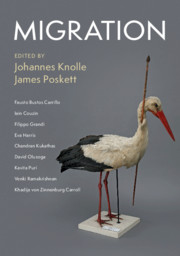Book contents
- Migration
- The Darwin College Lectures
- Migration
- Copyright page
- Contents
- Figures
- Notes on Contributors
- Acknowledgements
- Introduction
- 1 Black and British Migration
- 2 Immigration and Freedom
- 3 Art and Migration
- 4 Refugees and Migration
- 5 Migration of Disease
- 6 The Partition of India and Migration
- 7 Migration in Science
- 8 Animal Migration
- Index
3 - Art and Migration
On the Power of Movement, Light and Shadow
Published online by Cambridge University Press: 25 March 2020
- Migration
- The Darwin College Lectures
- Migration
- Copyright page
- Contents
- Figures
- Notes on Contributors
- Acknowledgements
- Introduction
- 1 Black and British Migration
- 2 Immigration and Freedom
- 3 Art and Migration
- 4 Refugees and Migration
- 5 Migration of Disease
- 6 The Partition of India and Migration
- 7 Migration in Science
- 8 Animal Migration
- Index
Summary
This chapter, which is divided into two parts, includes the script of the performance lecture Men in Waiting, preceded by the research on art and migration that underpins it. The project is in part a phenomenology of incarceration that studies what happens to perception when it is limited to the prison architecture used for immigration detention in the United Kingdom. It is also an artistic enactment of that subjectivity, and this text is a reflection on the time and space produced in this performative reflection. Through puppetry the performance takes place in a shadow world, not unlike that of Plato’s protagonist in the Republic who seeks to bring the people to enlightenment and is made a martyr as a result. Plato’s allegory would indicate that we all have access to the human condition of confinement in the dark with only shadows. However, the specific shadowside of the world as seen through the United Kingdom’s immigration detention centres was what this Darwin Lecture immersed the audience in. Writing and performing this play was a way to sit with the shadow, and within the shadow.
- Type
- Chapter
- Information
- Migration , pp. 50 - 78Publisher: Cambridge University PressPrint publication year: 2020



